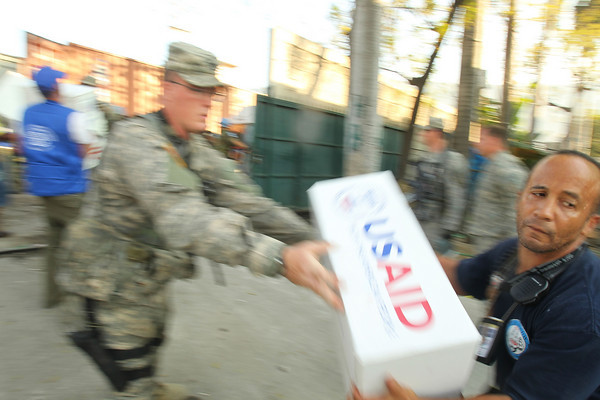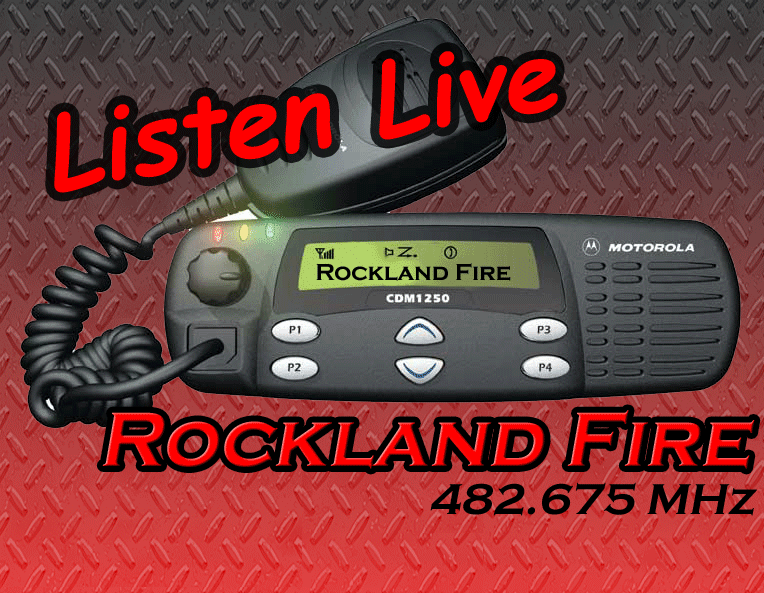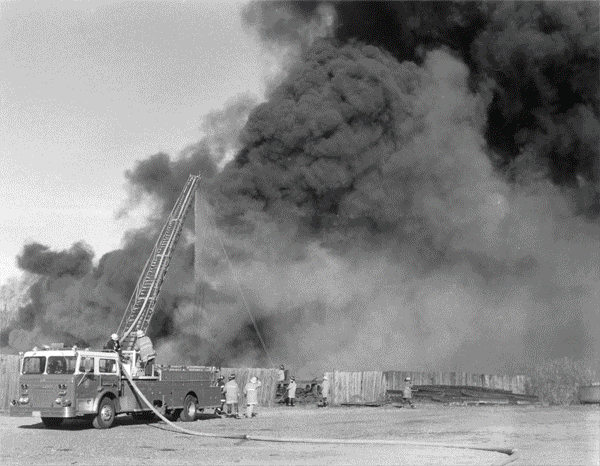As a Rockland firefighter for the last 26 years, Lt. Craig Erickson had never seen such destruction.
Erickson was part of the first wave of relief efforts to Haiti with a Disaster Medical Assistance Team (DMAT), based out of Mass General Hospital in Boston, after a 7.0 earthquake hit the small country on Tuesday, Jan. 12. He and his team, known as DMAT MA 1, founded by Dr. Susan Briggs, arrived there on Jan. 14 and experienced the aftershock that shook the country once again. It measured 6.2.
“We didn’t really have time to think about it,” Erickson said. “We just had to get right to work. But whatever damage there was got even worse during the aftershock.”
Getting to Haiti wasn’t easy either, according to Erickson. As he and others on their way to help with the relief effirst flew over the Turks and Caicos in a standard passenger plane around the size of a 727, the aircraft suddenly banked left and pulled straight up. Another plane passed directly underneath Erickson’s aircraft.
“Our plane lost one or two engines and fell,” he said, noting the plane was full of people. Although it was a harrowing situation, the plane was able to land on the Turks and Caicos.
Erickson and the people on his plane transferred to a Coast Guard aircraft and took off for Haiti. As they approached the country from the air, Erickson said he saw something that disturbed him even more.
“Looking down, you could see all the fires,” he said, noting most of the fires were set for the purposes of “burning dead bodies.”
But that was nothing compared to seeing the disaster up close and personal.
Being one of the first to arrive in Haiti for relief purposes, Erickson and his team witnessed complete devastation.
Crowds of people were living in the street in horrible conditions. Dead bodies were being burned in the street, as there was no place to put the dead. Buildings had been transformed into piles of rubble, where people were still trapped inside.
“And it’s not like you’d see the destruction here and there in certain places,” Erickson said. “You couldn’t walk one block without seeing it. It was everywhere. And there was gunfire – we helped a few people with gunshot wounds. Lots of innocent people were getting injured.”
Erickson said the area of Port Au Prince, the epicenter of the earthquake, was also one of the epicenters of gang violence in Haiti.
Serving as the logistics chief for DMAT MA 1, Erickson oversaw medical equipment, the medical facilities and the pharmacy.
“You slept when you could and you ate when you could,” he said. “When you weren’t doing those things, you were helping people.”
Erickson said DMAT teams, which are located all over the United States, are groups “of para-professional medical personnel designed to provide medical care during a disaster or other event…to supplement the standard DMATs, there are highly specialized DMATs that deal with specific medical conditions such as crushing injuries, burn and mental health emergencies.
“DMATS are designed to be a rapid-response element to supplement local medical care until other or Federal or contract resources can be mobilized, or the situation is resolved. DMATs deploy to disaster sites with sufficient supplies and equipment to sustain themselves for a period of 72 hours while providing medical care at a fixed or temporary medical site. The personnel are activated for a period of two weeks.”
His team was located in an area of Port Au Prince and it immediately established the Gheskio Field Hospital, a makeshift medical facility that offered triage, operating rooms, a pharmacy and other areas for care.
“We had about 35 tents set up where we could do all kinds of medical procedures,” Erickson said.
“We dealt with a lot of gangrene,” he said, noting many amputations were necessary on people of all ages, even infants. He added gangrene is, “the death of tissue caused by an interruption of the flow of blood to a part of the body.”
He said his DMAT team was working in concert with an International Medical Surgical Rescue Team (IMSRT), also based out of Mass General Hospital. Working with the medical teams was the 82nd Airborne, which was on hand to provide protection, as Haiti is a very dangerous place.
As his team and others addressed the ailing people, Erickson said the heat was a big factor influencing working conditions, as the humidity was affecting some of the medical equipment. The heat also affected the generators running the equipment, so teams had to be careful during medical procedures. Sometimes there would be power surges and sometimes things would just lose power.
One of the more profound moments occurred during one of these outages.
Erickson said a ventilator that was keeping a small infant alive lost power at one point. The doctor taking care of that baby manually operated the ventilator with his hand for the next eight hours until it could be fixed.
“That was remarkable,” Erickson said.
He added everyone on hand – whether they were a doctor or member of the military – “worked outside of their areas of expertise.
“It was a high-intensity atmosphere where we were all just trying to save as many people as possible,” Erickson said.
He added about 500 patients were treated at any given time at the field hospital. He said nine children were born in that hospital while he was there.
Erickson said sometimes, his team and others would leave the field hospital and venture out to help people in other areas of Port Au Prince. But the 82nd Airborne had to accompany anyone that did that, given the dangers.
“To see the DMAT, the IMSRT and the 82nd Airborne working together – it was pretty amazing,” Erickson said. “It was extremely unique. We saved a lot of lives together. I think it was a learning experience for everyone who showed up.
“It was tough, though. Two weeks is a long time to be there. You start missing your family and the gravity of the situation weighs on you. But that’s the lucky thing for us – we got to go home.”
Erickson said he is not sure whether his team will be redeployed to Haiti because, he said, “there were a lot of injuries on my team. It’s going to take a while for some people to recover.”
Reflecting on the mission, Erickson said, “The Haitian people are amazing. All of them – all ages – are so strong. They can get through this. It was an honor for me to be part of the first medical team in the country after the earthquake. And it was an honor to see how everyone worked together.”





















